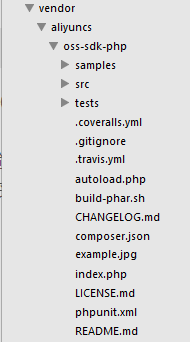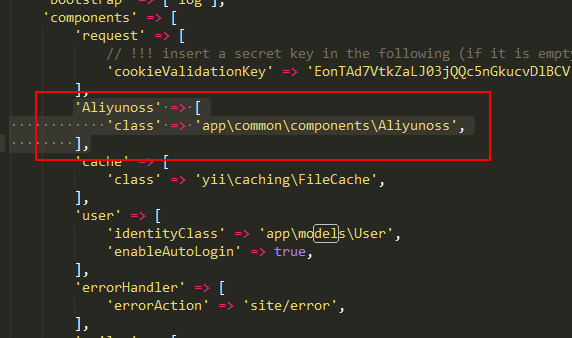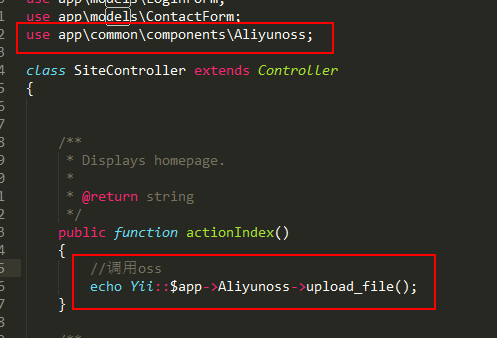After searching for half a day's data, we finally managed to connect YII2.0 to OSS object storage. It is assumed that you have installed YII2.0, and you have installed compose.
Step 1: install the OSS object component (i.e. the PHP API of OSS) console, enter the root directory of YII2.0, input: composer require aliyuncs / OSS SDK PHP, and then install it. After installation, aliyuncs folder is available in the root directory under verdor, as shown in the figure below: 
Here, the OSS object storage API has been installed. Next, it is integrated with YII2.0.
Part 2: create two folders common/components / in the root directory, and then create a file Aliyunoss.php in the components folder, as shown in the figure 
Next, we configure this component in the configuration file:
'Aliyunoss' => [
'class' => 'app\common\components\Aliyunoss',
],As shown in the figure: 
Here, YII2.0 successfully defines a component, and then we write the OSS API logic code in this component. First, configure OSS, and then configure OSS in params file, as shown in the figure:

Four parameters can be found in oss background. Here YII2.0 and oss are integrated. The next step is to type the code
Part 3: write the following code in the common/components/Aliyunoss file:
<?php
namespace app\common\components;
use Yii;
use yii\base\Component;
use OSS\OssClient;
use OSS\Croe\OssException;
class Aliyunoss extends Component
{
public static $oss;
public function __construct()
{
parent::__construct();
$accessKeyId = Yii::$app->params['oss']['accessKeyId']; //Get the accessKeyId of alicloud oss
$accessKeySecret = Yii::$app->params['oss']['accessKeySecret']; //Access keysecret of alicloud oss
$endpoint = Yii::$app->params['oss']['endPoint']; //Get the endPoint of alicloud oss
self::$oss = new OssClient($accessKeyId, $accessKeySecret, $endpoint); //Instantiate OssClient object
}
//Delete files / or folders
public function del_file()
{
$res = false;
$bucket = Yii::$app->params['oss']['bucket']; //Get alicloud oss bucket
if (self::$oss->deleteObject($bucket, "wocao/")){
//Call the deleteObject method to upload the server file to alicloud oss
$res = true;
}
return $res;
}
//Upload file
public function upload_file()
{
try
{
$bucket = Yii::$app->params['oss']['bucket'];
$a = self::$oss->uploadFile($bucket, time()."."."png", "kwk.png");
print_r($a);
echo "success";
}
catch(OssException $e)
{
printf(__FUNCTION__ . ": FAILED\n");
printf($e->getMessage() . "\n");
return;
}
}
//Download File
public function down_file()
{
$localfile ="yuzengyuan."."jpg";
$options = array(
OssClient::OSS_FILE_DOWNLOAD => $localfile,
);
try
{
$bucket = Yii::$app->params['oss']['bucket'];
self::$oss->getObject($bucket, "1513585444.png", $options);
}
catch( OssException $e)
{
printf(__FUNCTION__ . ": FAILED\n");
printf($e->getMessage() . "\n");
return;
}
print(__FUNCTION__ . ": OK, " .$localfile. "\n");
}
//Determine whether there is a file
function doesObjectExist()
{
try{
$bucket = Yii::$app->params['oss']['bucket'];
$exist = self::$oss->doesObjectExist($bucket, $object);
} catch(OssException $e) {
printf(__FUNCTION__ . ": FAILED\n");
printf($e->getMessage() . "\n");
return;
}
print(__FUNCTION__ . ": OK" . "\n");
var_dump($exist);
}
//Create virtual directory
public function create_dir()
{
try
{
self::$oss->createObjectDir("budfesdfd", "dirrrr");
}
catch(OssException $e)
{
printf(__FUNCTION__ . ": FAILED\n");
printf($e->getMessage() . "\n");
return;
}
print(__FUNCTION__ . ": OK" . "\n");
}
//Delete virtual directory
function createObjectDir()
{
try{
$bucket = Yii::$app->params['oss']['bucket'];
self::$oss->createObjectDir($bucket, "phpyuzengyuan");
} catch(OssException $e) {
printf(__FUNCTION__ . ": FAILED\n");
printf($e->getMessage() . "\n");
return;
}
print(__FUNCTION__ . ": OK" . "\n");
}
//List all user storage
public function listBuckets()
{
$bucketList = null;
try{
$bucketListInfo = self::$oss->listBuckets();
} catch(OssException $e) {
printf(__FUNCTION__ . ": FAILED\n");
printf($e->getMessage() . "\n");
return;
}
$bucketList = $bucketListInfo->getBucketList();
foreach($bucketList as $bucket) {
echo $bucket->getLocation() . "<br>" . $bucket->getName() . "<br>" . $bucket->getCreatedate() . "<br>";
echo "<hr>";
}
}
//Create storage space
public function create_Bucket()
{
try
{
self::$oss->createBucket("budfesdfd");
}
catch(OssException $e)
{
printf(__FUNCTION__ . ": FAILED\n");
printf($e->getMessage() . "\n");
return;
}
echo "success";
}
//Delete storage space
function deleteBucket()
{
try{
self::$oss->deleteBucket("yuzengbdfds");
} catch(OssException $e) {
printf(__FUNCTION__ . ": FAILED\n");
printf($e->getMessage() . "\n");
return;
}
print(__FUNCTION__ . ": OK" . "\n");
}
//Determine whether the storage space exists
function doesBucketExist()
{
try {
$res = self::$oss->doesBucketExist("budfe1sdfd");
} catch (OssException $e) {
printf(__FUNCTION__ . ": FAILED\n");
printf($e->getMessage() . "\n");
return;
}
if ($res === true) {
print(__FUNCTION__ . ": OK" . "\n");
} else {
print(__FUNCTION__ . ": FAILED" . "\n");
}
}
}Then you can use it in the controller, you need to introduce the namespace of aliyunoss.php, and then you can call it. 
Detailed API can be viewed https://help.aliyun.com/document_detail/32099.html?spm=5176.doc32102.6.758.J6e3WE Here